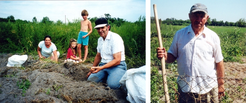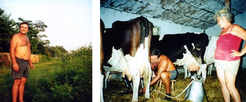Comparisons - Central European Villages Repeatedly Visited
The most basic change is that the cooperative is no longer active in agricultural production and all land has been returned to private ownership. The main results of my most recent fieldwork (2001) are reflected in Working Paper 26. They are also discussed elsewhere on this website: Current Research Project.
Many people believe that social inequalities have widened considerably, both between the countryside and the town, and within the village itself. They say that people no longer help each other, notably with housebuilding, nor do they get together for social purposes as they used to in the past (when a Dramatics Society organized by a teacher brought many people of very different backgrounds together on a regular basis).
Housing extremes in the upper hamlet

This house was built in the 1990s by a newcomer to the community who produces flowers for the national market; he declined to be inter- viewed or photographed.

This lady lives alone in the house on the right, which she inherited from her husband. With no kind in the region, she is dependent on the local social services.

István Gulyás demonstrating the quality of his potatoes (left, with wife) and (right) his red wine in his cellar. After pushing hard in the early 1990s to regain his previous ownership rights, he has since been obliged by increasing age to dispose of most of his land.
Postsocialism brought many old people the satisfaction of becoming owners of their patrimony once again. However, many of these people, such as the couple pictured left, were now too old to work this land, so the freshly acquired land was either sold or simply left uncultivated. With the cooperative withdrawing from agricultural production entirely, the total agricultural output of the community has fallen sharply. Villagers are bitter about the uncertainty in marketing, which contrasts with the stability they took for granted under socialism.

József Lázár is mildly handicapped and did not complete his basic education. In 2001 as in 1976 I found him living alone on a tanya, under the watchful eye of relatives but also supported with meals by the village council.
Comparisons - Central European Villages Repeatedly Visited

Sándor Dúl (ex-Party Secretary) and his family (left) in the potato field of Ferenc Gregus, August 2001.
As explained on the opening page of this site, my frequent visits have accentuated my impression of continuity in most village families.
For some, however, the 'change of system' (rendszerváltás) has also brought a personal transformation. Prominent among the 'losers' is Sándor Dúl, who helped me enormously in the 1970s when he was the agronomist with special responsibility for encouraging 'private sector' output. He later took on the job of Party secretary on a full time basis, and when this post disappeared in 1990 he found himself surplus to requirements. After a very difficult period, he and his wife managed to acquire quite significant landholdings through the redistribution process but, lacking the means to farm this land, they remain extremely poor. In the photograph below this family can be seen acquiring the potatoes they need by sharecropping on the plot of Ferenc, a former kulák (right), who carried out the initial ploughing here with his horse.

The Modok family
Proud of his potatoes is Imre Modok, pictured below with his wife on the plot adjacent to their tanya. This family, too, was once alleged to be kulák, but later Imre served long spells as a village councillor and cooperative committeeman. He was also an active member of the Land Redistribution Committee, where he argued strongly for the principle that the land should, whenever possible, be returned to its original owner. This was beneficial to Imre personally, since land on the other side of his tanya had been appropriated for vineyards that were planted by the cooperative in partnership with individual members. One strip of this large-scale vineyard was cultivated by Sándor Dúl, who would very much have liked to convert his rights into full ownership. Imre successfully opposed this and now collects annual rent from Sándor. He hopes that his son (below right, in their small cellar) will maintain the tanya and expand the farming activities in the years ahead; however, like Ferenc Gregus in the previous example, they do not as yet have any significant machines but depend entirely on two horses.
The committee which resolved land issues was led until its final dissolution in 1997 by Vincze Kovács, a former tractor driver at the cooperative and member of the village council in the late socialist years. During my fieldwork in 2001 I found that he spent more time on his tanya several miles away from the centre than in his modern house in the village.

Part of the explanation lay in the fact that he now owned one of the largest dairy herds in the village (six cows) and had managed to obtain good quality land exactly where he wanted. But another reason had to do with the animosity felt towards him by the many villagers who were dissatisfied with the workings of the Land Redistribution Committee, and who blamed its Chairman for overlooking their claims and supporting his own friends Vincze's comment on the wide experience of the 'system change' was a laconic (but also somewhat embittered) "This is not the horse we wanted!"






